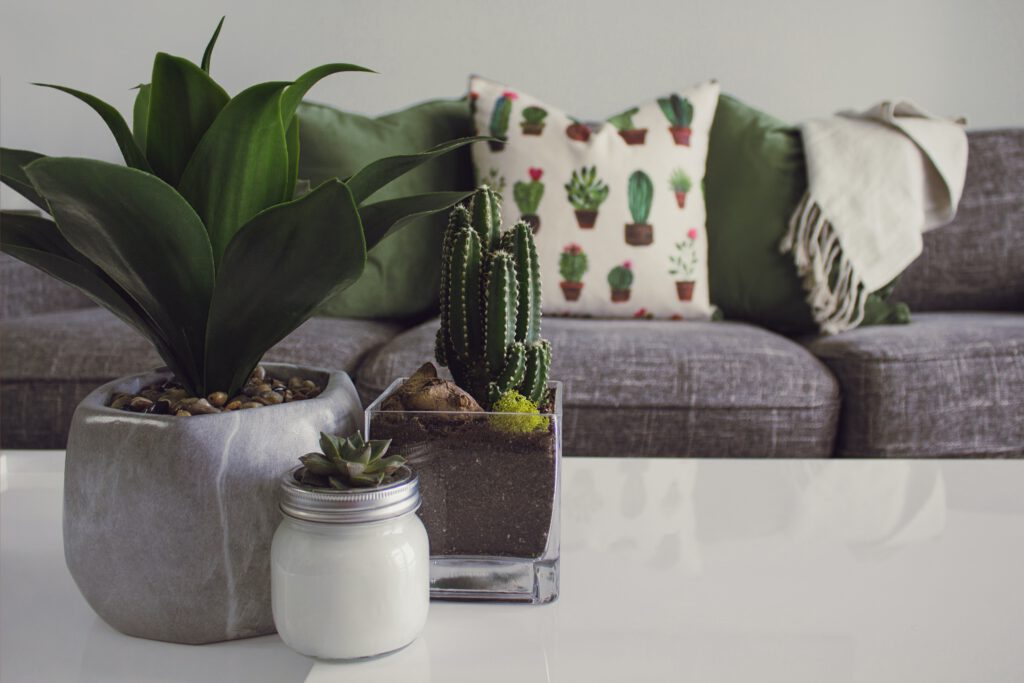Natural air filters - which plants are worth having at home
They're not just a beautiful decoration, they fit in with one of the most coveted interior design trends of recent years—potted plants, as we're talking about them, are beneficial to our health. Biophilia, or biophilic design, is a trend in interior design based on ecology and a passion for greenery. Complementing interiors with living potted plants is intended not only to decorate but also to purify the air of pollutants. Our ecological awareness is growing ever greater. We know about the harmfulness of smog that hovers over city streets, but we forget every day that harmful substances can be found in our own homes. Their sources can include:
- cleaning staff,
- glass cleaner,
- insecticides,
- wood preservatives,
- varnishes, oils,
The substances they contain, such as formaldehyde used in the production of household chemicals, xylene used in wood preservatives, or benzene, a component of insect repellents, can cause discomfort, headaches, or irritation of the conjunctiva, nasal mucous membranes, and throat, as well as drowsiness. It's therefore worth using natural remedies such as baking soda or vinegar . Fortunately, certain types of houseplants act as natural air filters. Which plants are best suited for this purpose?
- Dracaena
This exotic plant with narrow, elongated leaves resembles a small palm tree. It's not demanding to grow. It's worth giving it a sunny spot and watering it relatively frequently. Dracaena purifies the air of substances such as formaldehyde, xylene, benzene, and trichloroethylene.
- fern
Ferns are back in fashion, and fortunately, because this striking, easy-care plant with ridged leaves effectively removes formaldehyde from the air and can also help maintain the right humidity level in a room. It's worth remembering that ferns don't like direct sunlight, so it's best not to place them directly under a window.
- Golden Epipremnum
This beautiful plant, with long vines that can either hang effectively from hanging pots or climb along shelves and other surfaces, cleanses its interior of carbon dioxide, benzene, and formaldehyde. Golden epipremnum enjoys relatively bright sunlight. Also, be careful not to overwater.
- ivy
This very easy-to-grow, shade-tolerant plant is one of the greatest allies in the fight against air pollution. It effectively absorbs pollutants such as car exhaust, formaldehyde, trichloroethylene, xylene, benzene, and toluene. Ivy is a great plant to plant along the fences of home gardens, but it can also be successfully placed indoors.
- herbalist
This plant has distinctive bicolored leaves—a lighter stripe runs between each long, pointed leaf. This makes the herb very decorative. It's easy to care for because it's difficult to dry. It prefers bright locations, but not direct sunlight. In addition to absorbing carbon monoxide, xylene, and formaldehyde, it also helps neutralize electromagnetic radiation.
These are just a few of the plants that act as natural air filters. Plants like Sansevieria, Spathiflora, Aloe Vera, Hoja Rose, and Philodendron, among many others, also have beneficial effects. According to the World Health Organization, over 90% of the population lives in areas with an air quality index that exceeds the air quality index. If potted plants can help us combat this problem even a little, it's worth finding a place for them in our homes.
THE PUBLISHER'S CHOICE
Dried plums 1 kg BIOGO
- €7,01
- €7,01
- Unit price
- / per
Dried White Mulberries 500 g ORGANIC
- €5,84
- €5,84
- Unit price
- / per
Almonds 1 kg BIOGO
- €11,69
- €11,69
- Unit price
- / per
Cranberries sweetened with apple juice organic 1 kg BIOGO
- €16,37
- €16,37
- Unit price
- / per
Dried dates 1 kg BIOGO
- €4,21
- €4,21
- Unit price
- / per
Unpeeled buckwheat groats 1 kg BIOGO
- €2,81
- €2,81
- Unit price
- / per
Walnuts 800 g BIOGO
- €8,65
- €8,65
- Unit price
- / per
Peeled sunflower seeds 1 kg BIOGO
- €3,04
- €3,04
- Unit price
- / per
PULLED ORGANIC SUNFLOWER SEEDS 1 KG BIOGO
- €4,44
- €4,44
- Unit price
- / per












































































































































